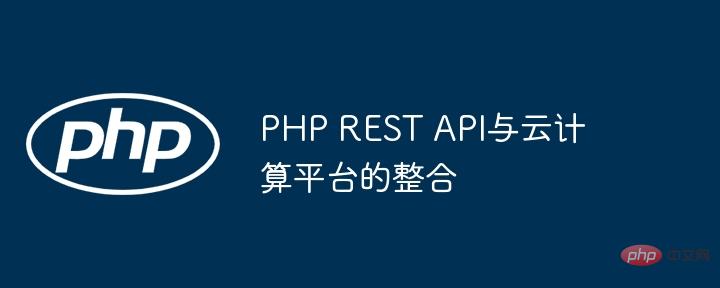
The advantages of integrating PHP REST API with cloud computing platform: scalability, reliability, elasticity. Steps: 1. Create a GCP project and service account. 2. Install the Google API PHP library. 3. Initialize the GCP client library. 4. Develop REST API endpoints. Best practices: use caching, handle errors, limit request rates, use HTTPS. Practical case: uploading files to Google Cloud Storage using Cloud Storage client library.

Integration of PHP REST API and cloud computing platform
Introduction
Cloud The computing platform provides REST APIs with the benefits of scalability, reliability, and resiliency. This article explains how to integrate the PHP REST API with a cloud computing platform, focusing on a specific example from Google Cloud Platform (GCP).
Steps
After creating the GCP project, create a Service account, which will be used by the API to access GCP services.
$projectId = 'YOUR_PROJECT_ID'; $serviceAccountEmail = 'YOUR_SERVICE_ACCOUNT_EMAIL';
To interact with GCP services, we need to install the Google API PHP library:
composer require google/cloud
Use the service account to initialize the required GCP client library, such as Datastore Admin:
$datastoreAdminClient = new Google\Cloud\Datastore\Admin\V1\DatastoreAdminClient([
'projectId' => $projectId,
'keyFilePath' => 'PATH_TO_SERVICE_ACCOUNT_KEY_FILE'
]);In our PHP REST API, create endpoints to interact with GCP services. For example, we can create an endpoint that lists all GCP datastore databases:
$app->get('/databases', function (Request $request, Response $response) {
global $datastoreAdminClient;
$databases = $datastoreAdminClient->listDatabases('projects/' . $projectId);
return json_encode($databases);
});Best Practices
Practical Case
We will create a small PHP REST API to upload files to Google Cloud Storage using GCP Cloud Storage.
Code
// 安装必要的库
composer require google/cloud
// 初始化 Cloud Storage 客户端库
$storage = new Google\Cloud\Storage\StorageClient();
// 定义端点将文件上传到 Cloud Storage
$app->post('/upload', function (Request $request, Response $response) {
global $storage;
// 获取文件内容
$file = $request->getUploadedFiles()['file'];
// 将文件上传到 Cloud Storage
$bucket = $storage->bucket('YOUR_BUCKET_NAME');
$bucket->upload($file->getStream(), [
'name' => $file->getClientFilename()
]);
// 返回成功响应
return json_encode(['success' => true]);
});Conclusion
By integrating the PHP REST API with the cloud computing platform, we can take advantage of the scalability of the cloud flexibility and powerful features to build powerful applications. By following the steps and best practices described in this article, developers can create cloud-native applications that are efficient, secure, and scalable.
The above is the detailed content of Integration of PHP REST API and cloud computing platform. For more information, please follow other related articles on the PHP Chinese website!